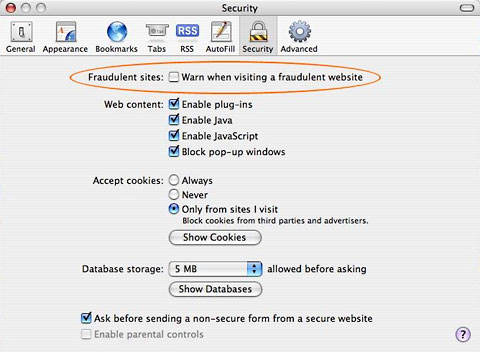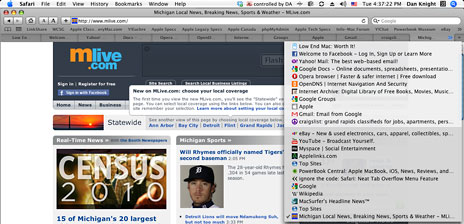I'm going to have to cop to giving up on Safari 4.1.3 too soon. If
you tuned in to our last episode, Safari 4.1.3 for Tiger: Fast,
but Not Perfect, you'll recall that I finally got around to
installing version 4.1.3 on one of my old Pismo PowerBooks, in hope of
escaping a nasty bug in the last Mac OS X 10.4.11 Tiger supported
version of my default browser, Opera. The bug causes long stalls when
attempting to enter text in webpage fields.
While impressed with the speed of Safari 4.1.3 (relatively speaking
- this is a 550 MHz G4 running Tiger), I noted a lot of hard drive
activity going on in the background with it running, even when I wasn't
doing anything with the browser.
I persisted for a couple of days while the hard drive busywork went
on in the background, but I really detest computer noise (memo to self:
you need a SSD), and it finally got on my nerves. I had discovered that
quitting Safari terminated the noise, so I did that and reverted to
Opera 10.6.3. I chronicled my adventure in last week's column, also
commenting on some other aspects Safari 4.1.3 that didn't entirely
enchant me, such as the necessity of running an installer rather than
just dragging the application from a mounted disk image as with most
browsers these days.
A Second Chance
However, several reader letters I received commenting on the issue
encouraged me to give Safari 4.1.3 another go. Anticlimactically, the
hard drive gave a few chatters after the application loaded - and then
it quieted down. The background activity hasn't returned in several of
days of using Safari as my default browser, happily with no text-entry
issues.
Now here's a curious thing. Over the weekend, both for
issue-comparison purposes and because I've provisionally decided that
Safari 4.1.3 is a preferable option to Opera 10.63 on my Tiger
machines, I installed the Security Update 2009-005 and this version of
Safari on my other Pismo. I encountered no hard drive background
activity issue, and I'm sure it's not because the 4200 RPM 100 GB
Seagate hard drive in that unit is a lot quieter than the 5400 RPM 40
GB Toshiba drive in the first Pismo. So go figure. Maybe it was
something unique to to that particular hardware/software combo,
although nominally both Pismos are running the same software and OS. Go
figure.
Consequently, I could no longer test to determine what the issue was
on either machine, but reader Patrick suggested it might be the
phishing database (SafeBrowsing.db)
being updated. That sounds plausible and would explain why the noise
spontaneously stopped - coincidentally it was only a minute or two
after the point where I had exasperatedly the quit the browser. Patrick
also noted that disk access caused by updating the SafeBrowsing.db is a
lot less noticeable on a faster computer (less effort to download and
process the file, the disk is acoustically quieter, etc.).

Safari can warn you about fraudulent websites.
Reader Matt wrote to say that he has also experienced earlier builds
of Safari causing excessive hard drive activity on a couple of old G3
Macs he uses, and that he was able to work around the problem by
disabling the option "Warn when visiting a fraudulent website", which
is in the "Security" tab of Safari's Preferences, which he found worked
like a charm on both of his elderly computers, and that he's been using
Safari as his main browser on both of them for several months.
Of course doing that causes increases your security risk, but I've
determined that is a lesser evil on this old machine that is used
primarily for researching information on the Web as well as drafting
and editing articles.
My intention is once again to use Safari 4.1.3 as the default
browser on both Pismos and retire Opera 10.6.3.
Browsers on My MacBook
Incidentally, I downloaded the latest Opera 11.10 beta on Friday and
find that it's a rocket sled of a browser on my 2.0 GHz Unibody MacBook
running OS X 10.6 Snow
Leopard.
It's hard to keep up with browser updates these days, but at least
Firefox 4 Beta
and Chrome 10, which I also
use on the MacBook, automatically load incremental version updates, and
you just have to quit and restart the browser to have the current
version. All three of these browsers have issued updates over the past
week, and they're all great, but I think Opera may have regained its
speed edge with this version 11.10 release.
Back to Safari on My Pismos
Back on the Pismos, as I said, Safari 4.1.3 now seems to be an
easier-to-get-along-with alternative to battling the Opera text input
bug. However, Safari is not without its own issues. For example, the
browser has crashed twice in three days. Browser crashes are something
I haven't experienced with a stable version Opera for some time - and
very seldom even with alpha and beta builds. Safari also has its own
share of spinning beachball time-outs, although thankfully not as
frequently or as long as with Opera's 10.6's text entry problem with
OS X 10.4.
I'm also less than enchanted with Safari's user interface
appearance, and its download manager, although serviceable, is lame
compared with Opera's best in class, reliably resumable download
manager.

After displaying a certain number of tabs, Safari puts the rest in a
pulldown menu.
Perhaps most irritating of all, I dislike Safari's pushing open tabs
off to a pulldown menu after the tab bar is filled widthwise, rather
than just shrinking the tabs smaller and smaller as Opera does.
These are relatively small annoyances, but they do add up. As I've
observed here previously, lack of browser compatibility will likely be
the issue that finishes OS X 10.4 as a satisfactory production OS.




